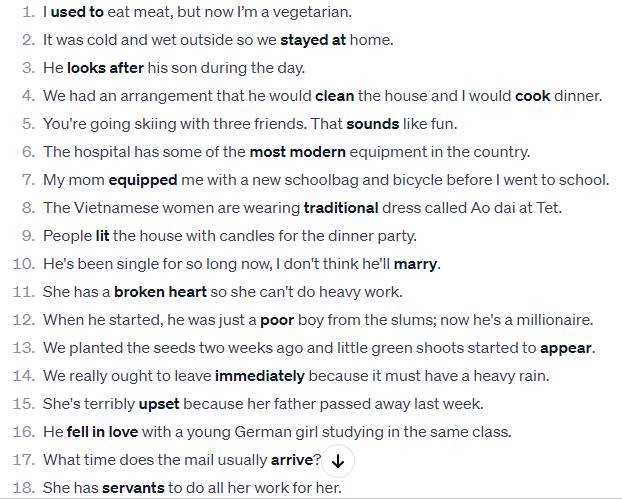I/ Put a/ an, the or Æ in each space to complete the following sentences. 1. I’m sorry. I didn’t mean to do that. It was _____ mistake. 2. There were no chairs, so we had to sit on _____ floor. 3. Lucy has just gotten _____ job in _____ bank in Chicago. 4. There’s _____ bookstore on _____ corner near my house. 5. It’s very cold in here. Can you close _____ window, please? 6. If you go past _____ post office, can you get me some stamps? 7. It was _____ very hot day. It was _____ hottest day of _____ year. 8. What’s _____ name of _____ woman who sat beside you at the dinner? 9. How often do you go to _____ movies? 10. “Can you tell me where _____ Room 306 is, please?” “It’s on _____ third floor.” 11. He lay down _____ ground and looked up at _____ sky. 12. You’ll find _____ information you need at _____ top of _____ page 24. 13. _____ moon goes around _____ earth every 27 days. 14. He doesn’t usually have _____ lunch, but he always eats _____ good breakfast. 15. If you live in _____ foreign country, you should try and learn _____ language. 16. _____ next train to Brighton leaves from _____ Platform 5. 17. Last year we visited _____ Canada and _____ United States. 18. _____ highest mountain in _____ Africa is _____ Kilimanjaro. 19. _____ Mediterranean Sea is the sea between _____ Africa and _____ Europe. 20. _____ Mississippi is _____ longest river in _____ North America. |
Hãy nhập câu hỏi của bạn vào đây, nếu là tài khoản VIP, bạn sẽ được ưu tiên trả lời.

1. a 2. the 3. a/ a 4. a, the 5. the
6. the 7. a/ the/ the 8. the/ the 9.the 10. ∅ / the
11. the/ the 12. the/ the/ ∅ 13. The/ the 14. ∅ / a 15. a/ the
16. The/ ∅ 17. ∅ / the 18.The/ ∅ / ∅ 19.The/ ∅/ ∅ 20. The/ the/ ∅

Đáp án C
Nhà văn nói rằng khi ông còn rất trẻ ________.
There were two sisters ahead of me inthe family, and though of course I didn't know it, there was an exciting talk of emigration, possibly to Canada but more usually to England, the land of opportunity. I guess that plans werealready being made when I was born,
A. ông ấy rất buồn vì cha mẹ anh ấy đã bỏ đi
B. ông ấy rất muốn đi Anh
C. cha mẹ ông đã quyết định rời đi
D. cha mẹ của ông đã thay đổi kế hoạch của họ


ngắn thôi .-.
Bài có nhiều đâu cậu?